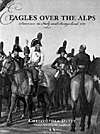 Author: Christopher Duffy
Author: Christopher Duffy
Pages: 288
Illustrations: 73 black and white, mostly current photos of the terrain
and towns featured in the text, with a few period portraits and new art
by Bill Younghusband.
Maps: 34 (5 strategic, 13 operational showing division and brigade
movements, and 16 tactical with individual regiments and battalions
noted).
Footnotes: 416
Appendices: None, but there are 11 very detailed orders of battle within
the main text.
Bibliography: 99 primary and secondary, including Suvorov's
correspondence and foreign manuscript sources.
Index: 582 entries
Publisher: The Emperor's Press, Chicago
Publication Date: 1999
Binding: Cloth (hardbound)
ISBN: 1-883476-18-6
Price: $35.00
Summary: A leading authority on 18th- and 19th-century warfare,
Christopher Duffy brings the eccentric Russian Field Marshal Suvorov's
brilliant 1799 campaigns in northern Italy and Switzerland to life in
this painstakingly researched and elegantly written military history.
With the publication of Eagles Over The Alps Christopher Duffy rescues an important military campaign of the French Revolutionary Wars from obscurity in a detailed and altogether captivating operational history (see featured excerpt in this issue starting on page 18). Until now, what has been written about Russian Field Marshal Aleksandr Vasilevich Suvorov's 1799 campaign in northern Italy and Switzerland lacks depth and/or objectivity. As the author puts it: "The story has been related often enough..., but seldom free of contamination (not too strong a word) through ideology, ultra-nationalism and the cult of personality." Utilizing extensive primary source research, Duffy presents a more balanced description of the campaign and the man, "unadorned by fertile conceits, and devoid of those florid expressions that are calculated to excite the fancies of the reader."
Duffy expresses another purpose in writing the book. Most campaigns of the French Revolutionary Wars receive cursory attention from historians unless Bonaparte is involved. The fascination with Napoleon's campaigns seems to have lured scholars away from the study of military operations where he played no part. Nevertheless, many of these campaigns were important to the outcome of the wars that raged from 1792 to 1800. Duffy's book fills an important gap in information about the campaigns of the Second Coalition against Revolutionary France.
Christopher Duffy was a Senior Lecturer in War Studies for 35 years at Britain's Sandhurst Royal Military Academy. As a specialist on the Austrian and Russian military in the 18th and 19th centuries, his book credits include The Army of Frederick the Great, The Army of Maria Theresa, and Austerlitz 1805.
Duffy's hero Suvorov was known as the "Father of the Russian Soldier" and is a man of almost mythical proportions in Russia. For this reason there have been no unbiased, strictly professional biographies of the man, nor of this campaign, until now.
Although Duffy obviously thinks highly of Suvorov's abilities and puts them in context, he is not deterred from revealing the Field Marshal's sometimes very odd philosophies and habits. Reading some of these entertaining accounts of Suvorov's antics, one might be forgiven for occasionally wondering if perhaps the feisty little man was quite mad. On the other hand, the author helps us understand that Suvorov was a brilliant leader and an intellectual, and thus many of his theatrics may have been staged for the good effect they had on his brave, deeply religious, but ignorant peasant soldiers.
Duffy's careful analysis of "Suvorovian" tactics puts many myths regarding his military doctrine to rest. Suvorov preached three principles of war as the keys to victory, to the virtual exclusion of all others. These were coup d'oeil (the ability to read ground and to understand the situation quickly), speed, and impetus. We certainly see these principles in action as the Austro-Russian army under Suvorov drives the French from northern Italy, defeating not only General Moreau, but also Macdonald (at The Trebbia) and Joubert (at Novi). Suvorov was often cast as a proponent of the bayonet assault in column.
The truth is he was very much an advocate of the bayonet assault, but his troops attacked in line, not in column. Duffy quotes one knowledgeable contemporary observer as saying that the Russians in fact fought in only two close-order formations — line when things were going well for them, and square when they were not. The author impressively illustrates by his battle descriptions just how easily the Russian musketeers adapted light infantry tactics. The Russian foot soldier is too often portrayed as brave but dumb, capable only of ponderous movement in masses. Duffy paints a different picture of these soldiers, at least when under Suvorov's command.
Duffy does not neglect the Austrians who fought with Suvorov. He examines the level of cooperation between the allies and concludes that in spite of stresses, the relationship worked well and greatly contributed to the success of the operations in northern Italy, although not as well in the failed operation in Switzerland. The numerous maps and author's photos of the incredible terrain Suvorov's army had to overcome are of significant help in Professor Duffy's telling of this marvelous adventure story, and also bear testimony to the author's dedication to getting the story right. (Only some poor proofreading and editing distract from an otherwise beautiful presentation). Eagles Over the Alps is military history at its best.
Napoleonic Library
-
Book Review: Eagles Over the Alps
Book Review: Napoleon and History Painting
Book Review: Napoleon's Elite Cavalry
Book Review: Napoleon in the Holy Land
Book Review: Napoleon and Austerlitz
Book Review: Blundering to Glory
Book News: Review Policy
Book Review: Followup: Greenhill Napoleonic Wars Data Book
Book Review: Errata for Swords Around the Throne
Back to Table of Contents -- Napoleon #15
Back to Napoleon List of Issues
Back to MagWeb Master Magazine List
© Copyright 2000 by Napoleon LLC.
This article appears in MagWeb (Magazine Web) on the Internet World Wide Web.
The full text and graphics from other military history magazines and gaming magazines are available at http://www.magweb.com
Order Napoleon magazine direct